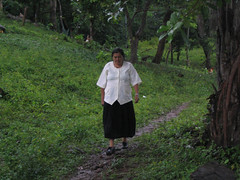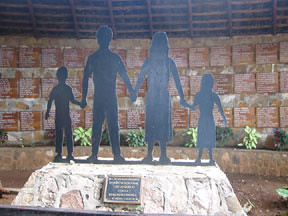Hola tod@s.
Long entry today.
On Monday we visited a couple more praxis sites. In San Ramon, first we visited a school, then a Christian Base Community, and a soy project. This Christian Base Community was originally affiliated with the local parish. However, when the supportive Maryknoll priests left and a new conservative Salvadoran Diocesan priest was installed in the parish, he wanted to keep the laity, especially the women, from being so involved as they had been. He wanted to be treated like Jesus, they told us. The community had a theology based on justice and peace, and de did not support them, so they split off from the parish, and they now hold their own church services, without a priest. They still call themselves Catholic, but they don't attend the masses at their parish. They do have priest friends who consecrate the Eucharist for them, but because they feel the consecrated Eucharist leaves some people out (those who haven't received first communion, those who aren't baptised, etc.), they also like to have something else, like fruit or a pupusa, that they split and share, that all can take part in, because to them the point Jesus was making at the last supper was not just about the bread and wine being his body and blood, it was also about sharing food in his memory. I can't explain it very well - they did it a lot better. It's hard for me to capture their theology, especially since I'm writing this a while after being there, but it was very interesting. We're going to one of their services on Sunday (it's optional, but I'm going to go). I'm looking forward to seeing what it's like.
We also went to Mariona, the site of the women's artisan cooperative. I loved it there. They told us about the organization, and they told us about Silvia Arriola, after whom the cooperative is named (as is Casa Silvia, one of the houses the Casa students live in). Basically all I know about her is from what they told us on Monday, but she was a nun and she was devoted to working with the poor. She made the decision to go and minister to the people in the mountains, many of whom were the guerrillas - the leftist forces in the civil war. She was also a nurse, so she was a religious presence and was able to take care of people medically. She wasn't doing it with political motivations, but with a desire to serve people who needed help. She was killed January 17, 1981, in an offensive by the military. She was in a hospital, and they came to the hospital, killed everyone inside, poured gasoline on them, and lit them on fire. The woman who told us this story lived in a small community with Silvia, and Silvia was her mentor. She started crying as she told the story, and she said it's always difficult to share the memories. She and the others helping her talk about Silvia said when they remember these things it's like they're reliving them. They also said that when Silvia and so many others were killed, they weren't able to cry. Part of it was that there was almost no time, but the real reason was that if they were seen crying, they would become targets themselves because the military would say they were siding with the guerrillas. She said that's why she cries now, because she can now, and she couldn't then.
Tuesday we didn't go to any praxis sites, but it was an intense day. We started by watching
Roses in December, a movie about the four American churchwomen (three nuns and a lay woman) who were murdered in 1980. I definitely cried when, at the end, they played the song Be Not Afraid, which we had sung in our prayer group the night before. That song is so beautiful.
Be not afraid
I go before you always
Come, follow me
And I will give you restWe went to the place where the bodies of the women were found, and a woman who knew Jean Donovan and Dorothy Kazel spoke to us for a while.
In the afternoon we went to the Hospital Divina Providencia. It's a hospital for terminal cancer patients. Romero chose to live there and spend time with the Carmelite sisters there while he was Archbishop, and he was killed while he was saying Mass in the chapel there. They have converted the place he lived into a little museum, so while we were waiting for some people ahead of us to leave, one of the sisters (I think her name was Bernadeta) spoke to us. She spoke English (with a heavy accent), and she told us that she wasn't there when Romero was there, but it was thanks to him that she spoke English. She said she lived in the U.S. for a while, but she was moved to Guatemala for 10 years, where she spoke only Spanish, and then when she was moved back to El Salvador and started working at the hospital, she knew a lot of English vocabulary, but couldn't speak English, so she prayed to Romero to be able to speak English and it worked. She talked a lot more about Romero, but I'm not going to go into it here. (By the way, if you haven't seen the movie
Romero, you definitely should.) One more thing to note though, is she told us that when they were embalming Romero after he was killed, they put his internal organs in a box and gave it to the sisters. They buried it, but three years later they dug it up again (I wasn't really clear why, but I think it was to make sure they knew where it was). His organs were in the same condition as when they buried them.
Tuesday evening Fr. Dean Brackley, an American Jesuit who came down to work at the UCA after the six Jesuits were killed in '89, came to speak with us. He is one of the founders of the Casa program. He gave some good advice, and one thing he said struck me in particular. He said that when we feel helplessness, to understand that that is probably the closest we'll get to solidarity with the poor, and understanding their feelings of helplessness.
On to Wednesday. We visited three praxis sites: La Chacra, Amatepec, and Colón. In La Chacra we visited a school called Fe y Alegria, and a nun spoke to us. She told us (in English - she's from Ireland) stories about the students and the community. Up to this point we've heard that the situation here is bad, but this was the first time we heard real details. It was intense. There was one story and quote in particular that I wrote down while she was talking to us. She said there's a big problem with alcoholism and drug use, and often the children have to go out to find their parents lying drunk in the street. One student always had to do this for his father, but he didn't get mad about it. He said, "I try to see in him the broken Jesus." How beautiful.
The other places we visited were good, but I'm short on time and they weren't that special, so I'll skim over them. In addition to Fe y Alegria, we went to the parish in La Chacra, which has a lot of programs for the community. In Amatepec we visited an Episcopalian parish that a couple students will be working with. It's in a neighborhood primarily populated by refugees from the war - people who were displaced from the countryside because of the fighting. Colón was a more rural area. The students will be spending a lot of time with members of the community, especially playing with a whole lot of kids. Everyone seemed really nice, and I think it will be a fun site.
Bueno. Classes started today (I think I told some people they started on Monday because I was confused before). I had Spanish this morning. We took a test to evaluate our level of Spanish. It went all right. The choices are Advanced Spanish or Conversational, which is super-advanced Spanish. I only tried for Advanced because I know I still need to work on grammar stuff. This afternoon I have my sociology class (in Spanish - eek!). I need to go now so I can get to class. Adiós.


